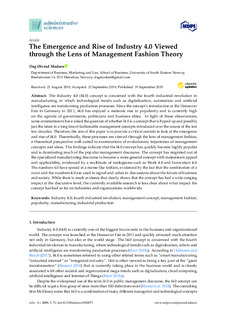| dc.contributor.author | Madsen, Dag Øivind | |
| dc.date.accessioned | 2019-10-25T09:25:06Z | |
| dc.date.available | 2019-10-25T09:25:06Z | |
| dc.date.created | 2019-09-12T23:47:51Z | |
| dc.date.issued | 2019 | |
| dc.identifier.citation | Administrative Sciences. 2019, 9 (3). | nb_NO |
| dc.identifier.issn | 2076-3387 | |
| dc.identifier.uri | http://hdl.handle.net/11250/2624403 | |
| dc.description | This article is an open access article distributed under the terms and conditions of the Creative Commons Attribution (CC BY) license. | nb_NO |
| dc.description.abstract | The Industry 4.0 (I4.0) concept is concerned with the fourth industrial revolution in manufacturing, in which technological trends such as digitalization, automation and artificial intelligence are transforming production processes. Since the concept’s introduction at the Hannover Fair in Germany in 2011, I4.0 has enjoyed a meteoric rise in popularity and is currently high on the agenda of governments, politicians and business elites. In light of these observations, some commentators have asked the question of whether I4.0 is a concept that is hyped up and possibly just the latest in a long line of fashionable management concepts introduced over the course of the last few decades. Therefore, the aim of this paper is to provide a critical outside-in look at the emergence and rise of I4.0. Theoretically, these processes are viewed through the lens of management fashion, a theoretical perspective well suited to examinations of evolutionary trajectories of management concepts and ideas. The findings indicate that the I4.0 concept has quickly become highly popular and is dominating much of the popular management discourse. The concept has migrated out of the specialized manufacturing discourse to become a more general concept with mainstream appeal and applicability, evidenced by a multitude of neologisms such as Work 4.0 and Innovation 4.0. The numbers 4.0 have spread in a meme-like fashion, evidenced by the fact that the combination of a noun and the numbers 4.0 are used to signal and usher in discussions about the future of business and society. While there is much evidence that clearly shows that the concept has had a wide-ranging impact at the discursive level, the currently available research is less clear about what impact the concept has had so far on industries and organizations worldwide. | nb_NO |
| dc.language.iso | eng | nb_NO |
| dc.relation.uri | https://www.mdpi.com/2076-3387/9/3/71 | |
| dc.rights | Navngivelse 4.0 Internasjonal | * |
| dc.rights.uri | http://creativecommons.org/licenses/by/4.0/deed.no | * |
| dc.title | The emergence and rise of Industry 4.0 viewed through the lens of management fashion theory | nb_NO |
| dc.type | Journal article | nb_NO |
| dc.type | Peer reviewed | nb_NO |
| dc.description.version | publishedVersion | nb_NO |
| dc.rights.holder | © 2019 by the author | nb_NO |
| dc.source.pagenumber | 25 | nb_NO |
| dc.source.volume | 9 | nb_NO |
| dc.source.journal | Administrative Sciences | nb_NO |
| dc.source.issue | 3 | nb_NO |
| dc.identifier.doi | https://doi.org/10.3390/admsci9030071 | |
| dc.identifier.cristin | 1724275 | |
| cristin.unitcode | 222,57,3,0 | |
| cristin.unitname | Institutt for økonomi, markedsføring og jus | |
| cristin.ispublished | true | |
| cristin.fulltext | original | |
| cristin.qualitycode | 1 | |

